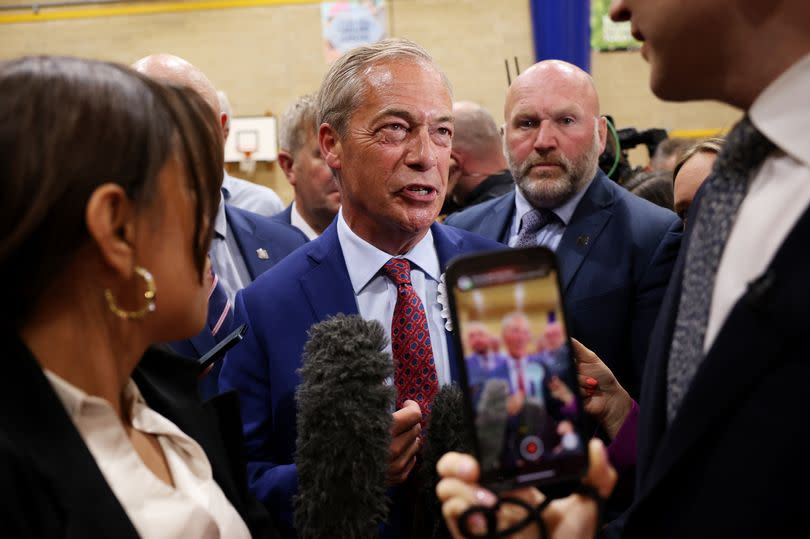The Nigel Farage effect: How Reform UK overnight became one of the biggest forces in Welsh politics

Last night a massive 223,018 people in Wales did something few political experts expected. They voted for Nigel Farage's party Reform UK. That's 17% of the total number who voted. It makes Reform the third largest party in Wales in terms of vote share. And if they had been able to field a candidate in Blaenau Gwent, they might well have come second.
Just a few weeks ago, the party was nowhere in terms of its electoral presence in Wales. It all began on June 3, after Rishi Sunak had made his now fateful decision to call the election, Nigel Farage called a press conference and announced he was taking control of the party from Richard Tice and he was going to stand as a candidate in the Essex candidate of Clacton.
A month later, Nigel Farage and three other Reform candidates will be going to the House of Commons. Across the UK in scores of constituencies, Reform was the second largest party.
READ MORE: The full map of the general election results in Wales and across the UK
No Reform UK candidates were elected in Wales - of the 32 seats here, 27 went to Labour, four to Plaid Cymru and one to the Lib Dems. And yet, their vote share tells us an awful lot because in 13 constituencies in Wales, Reform UK came second.
In a number of seats in Wales, Reform took thousands of votes and not just from the Conservatives, but Labour and Plaid Cymru too. It doesn't matter where you look on the electoral map, the numbers for Reform UK are high. In Ceredigion, Plaid Cymru's Ben Lake won comprehensively with 21,778 votes. The Reform candidate had a quarter of that number, some 5,374.
In Aberafan and Maesteg, for example, a traditionally Labour seat, Reform's Mark Griffiths took 21% of the vote. At the other end of the country, in Alyn and Deeside, the candidate got 22% of the vote.
In Merthyr Tydfil, the place Mr Farage chose to announce the party's equivalent of a manifesto, the candidate got more than half the number of votes of the successful Labour MP.
On election night we had reporters at counts across Wales talking to candidates from all parties. There was one thing in common between Reform candidates, and that was enthusiasm and excitement.
Few Labour MPs in Wales were quiet about how worried they are. Gower MP Tonia Antoniazzi said Labour should be "concerned" about the votes Reform had taken from the party.
Alun Cox, Plaid Cymru’s campaign manager, in Rhondda and Ogmore, where the Reform candidate Patrick Benham-Crosswell got 26% of the vote, he said: "It is likely they will take votes from ourselves and Labour." His party colleague in Swansea West, Gwyn Williams, told our reporter: "The main thing tonight is the huge increase in the Reform vote, which is worrisome, although the Plaid vote has also increased. A lot of the votes have been taken from the Conservatives, but also from Labour, which is indicative of some form of discontent so we need to look into that otherwise we might potentially lose the city in the future".
Vale of Glamorgan Green Party candidate Lyndon Mack said: "We will have to see how long they are around for. There's a lot of concerns driving the Reform vote but I don't think they have answer. It is a cry for help."
Charlie Evans, the Conservative candidate for Llanelli said: "Reform are eating in to our vote predominantly but also into the Labour vote across the historically ‘Red Wall’ areas."
It is not new for Wales that an emerging party can capitalise on the timing of an election. In 2016, at the height of Brexit-mania, Ukip secured seven seats in the then-Assembly. Reform's political opposition seems to have realised that tonight's result is a warning that unless they act, in two years, at the Senedd election, a Senedd election where there will 96 not 60 MSs in Cardiff Bay elected via a different voting system, Reform will make gains.
Nigel Farage coming to Merthyr Tydfil for his campaign's launch shows he thinks there is ground to be made up here. There is little doubt some Reform voters were voting against the Conservatives, Labour or Plaid but what will be more worrying for the more traditional, more established parties, is that plenty of people were happy to vote for Reform in their own right.
Catrin Thomas, Reform candidate for Gower, said she was surprised by the “really enthusiastic” response on the doorstep. She said: “The thing that I heard constantly was not that I’m going to vote for you, more often than not they were saying I’m going to vote for you and so is everyone I know."
She added that people were positive about Reform, rather than “banging on about how awful the Tories are or how awful Labour is. They were saying how fantastic it was to finally have someone to vote for.”
Additional reporting: Abbie Wightwick, Rob Harries, Branwen Jones, Rich Youle.

 Yahoo News
Yahoo News 
